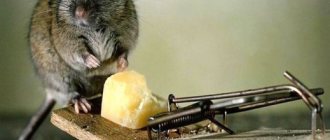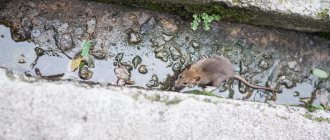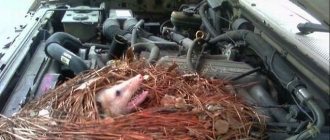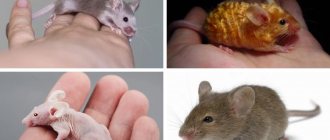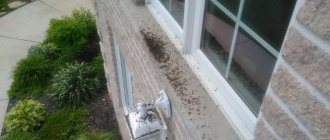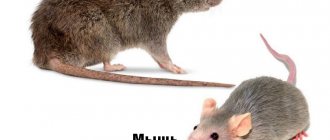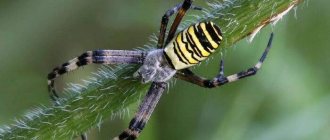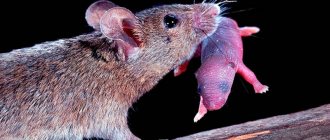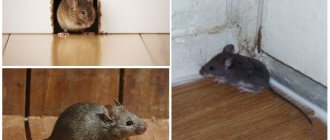Foul symptoms
The mouse smell cannot be confused with anything else
Modern methods of fighting mice and rats cannot always protect owners from such an incident as poisoned dead mice that find themselves in inaccessible places in the house. Therefore, during measures to exterminate rodents, you need to direct your efforts, first of all, to searching for the corpses of rodents.
How to find a dead mouse in the house? Those killed in a garage, barn or other outbuildings can be detected, for example, by their burrows. If it is inconvenient to remove them from there, make a wire hook - it will be easier to get them out. If nothing works out, you need to frequently ventilate the room and treat the mink with an antiseptic.
Places where you need to believe are bags of cereals or flour, behind baseboards, lower shelves in cabinets in the kitchen, most likely where ants and midges have accumulated.
Important! Not only a dead rodent is a source of stench. The urine of mice and their droppings also have a foul smell, which you have to get rid of while simultaneously fighting the rodents themselves.
Ways to detect a dead mouse
An unpleasant smell in a room forces a person to open windows, use air fresheners, and look for the cause of the stench.
It’s easy to tell what a dead rat smells like. The body begins to stink so much that nothing helps. Every day the stench gets worse, it’s impossible to stay in the room. The smell of rotting hurts the nose, causes nausea, and the urge to vomit. The room smells of rot, corpses, mice. You can feel it 3 days after the death of the rodent. As the body decomposes, the stench intensifies and envelops the entire room. The smell of a dead rat is impossible to miss. The main difficulty is to find the location of the corpse.
Dead rat
To eliminate unpleasant odor, it is necessary to find out the source of its occurrence. This is easy to do if the corpse of a rodent lies on the floor and is visible to the naked eye. But often, a rat or mouse dies in hard-to-reach places, which complicates the search.
In old furniture
To get rid of the smell of mice that comes from the sofa, you need to lay it out and carefully inspect it for the presence of rodents. The corpse of a dead mouse may end up under removable housing elements or under upholstery material. For detection and subsequent removal, the boards need to be unscrewed, the bevel must be torn off or removed.
In the ventilation
This is a favorite place for rodents; here they can simply hide or build a nest. If one of them died here, the smell will spread literally throughout the house. Therefore, it is necessary to begin the immediate destruction of the “incense”, along with the discovered corpse. It’s worth saying right away that using an air freshener will not help radically solve the problem; more serious methods are needed.
In bags of cereals
Animals are attracted to food storage areas that can be easily accessed. For example, through cracks, ventilation holes. If cereals are stored in unsealed containers, but in ordinary plastic bags or bags, mice gnaw through them and get inside. Afterwards, all stocks must be disposed of. So housewives should take care of having well-closing containers.
Under the baseboard
Rodents that run into a person’s home can climb into the gap between the wall and the baseboard and die there. To remove the smell of mice in the house, you will have to dismantle the baseboard and carry out a thorough treatment. All existing cracks and holes should be sealed with cement mortar with the addition of broken glass. Be careful when working, otherwise you may injure yourself.
If a mouse has been in the house, all surfaces must be treated, not just the floor, walls, cabinets and other objects. You can also use any folk remedy for this.
Furniture
A vinegar solution is used to clean leather upholstery and varnished surfaces. To do this, you will need to prepare a solution: water and the bite are mixed in equal proportions.
Upholstered furniture can also be damaged by rodents. However, it cannot always be washed like removable bed linen. But you can clean mattresses, sports bags, sofas and armchairs without any problems. To do this, make the following solution:
- 0.5 liters of water and the same amount of pure alcohol (vodka 40% is also suitable);
- 120 grams of baking soda;
- 15 ml of any essential oil.
Boil water, cool to room temperature, pour into a spray bottle. Next, add the remaining components here. Spray the solution onto the upholstery of upholstered furniture and wait until it dries completely. You don't need to do anything else. If the smell remains, repeat the procedure one or two more times, you can increase the amount of essential oil by 5 ml.
You can get rid of a mild mouse “incense” using a soap solution and a brush. Dissolve 1/2 bar of laundry soap in warm water, after grating it on a coarse grater. After treatment, repeat the process, but with clean water. If the weather permits, it is better to do this outdoors, because at home it is not always possible to “successfully” clean the carpet; there will definitely be stains.
To do this, you need to hang the carpet on a rope and stretch a hose to this place. Wet with water, apply shampoo or a special cleaner for carpets. Rub with a brush, paying special attention to the area from which the mouse smell emanates. Leave for literally a few minutes so that the product is deeply absorbed into the carpet fibers, thereby breaking down the dirt. Rinse well with water from a hose.
If the smell remains, the procedure should be repeated. Some housewives recommend using baking soda first (sprinkling it in an even layer on the carpet), then cleaning with shampoo.
For more severe dirt, use a vacuum cleaner or steam cleaner. If cleaning yourself does not bring a positive result, the carpet should be dry cleaned.
You can determine the presence of rats in the house by smell. They smell like an uncleaned hamster cage. Mice smell similar (the smell of mice is described in detail here). However, the real problem begins when these parasites die. And quite often they do this behind walls, under floors or in the attic.
It is almost impossible to get their corpses, and the house is enveloped in a cadaverous stench, which is dangerous not only because of its unpleasant odor, but also because it can cause severe poisoning. In this article you will learn about how corpses smell, what to do if a rodent has died in the house, how to find a dead rat, how much a cold corpse of a parasite will stink, how to remove the smell and much more.
We suggest you familiarize yourself with how long an ant lives, life expectancy
The appearance of rodents in the house is a very unpleasant phenomenon that occurs in some private and country houses.
The urine of mice and their droppings cause a specific smell, and if the rodent is dead, the smell becomes not just unpleasant, but unbearable.
Before carrying out measures to remove mice, it is necessary to provide for actions that will avoid the appearance of poisoned carcasses in inaccessible places.
If a mouse has died under the floor, then the question of how to get rid of the smell can be solved by using special preparations that have been tested in practice and recommended for use by deratizers. When treating surfaces with any of the listed means, special attention must be paid to the places where the baseboards adjoin walls, corners and other hard to reach places.
- Wooden surfaces should not be treated with liquid preparations, since urine along with the liquid can be absorbed deep into the wood, so in such cases it is better to use absorbents in powder form, and then use sprays to get rid of the odor.
- Mouse marks are more difficult to remove from plasterboard surfaces. It is advisable to cut out a certain section of drywall or replace the entire sheet.
- To treat a chipboard surface, you need to wipe it with alcohol and then with a neutralizing chemical composition.
In the case of dead mice, it is extremely important to find their corpses in order to eliminate them by cremation or burying them deeper in the ground. The area where the dead rodents were found should then be thoroughly disinfected. Because the release of cadaveric poison will have a detrimental effect on the health of people and animals living in the house.
If you introduce ants into the house, the problem with the smell will, of course, be solved, but you will have to remove the subsequently multiplied ants, so this is also not an option.
- Country of origin: Russia.
- The release form is a concentrated liquid that retains its properties even after defrosting.
- Packaging: 1 liter durable plastic bottles.
- The substance contains alkyldimethylbenzylammonium chloride (5%), dodecyl dipropylene triamine (7%), polyhexamethylene guanidine hydrochloride (4.5%).
- Kills many pathogenic bacteria, effectively eliminates odors from mice, sick people and under other circumstances, and also removes mold and mildew in the bathroom.
- The average price is 535 rubles.
Every housewife and home owner should know why the ammonia smell coming from mice or rats can be dangerous, and also how to look for the source of this problem. Let us note several solutions: There are several methods that can significantly reduce the evaporation of an ingrained nasty odor, and these include the following recipes:
If you resort to using professional odor removers, you can use preparations special for this purpose. Such products can usually contain chlorine or ammonium chloride, various masking substances, phenols, micro-disinfectants, as well as various agents that disinfect the room and block the growth and reproduction of bacteria.
Mummifying substances are added to modern rat poison for such cases. The body does not rot and dries slowly. The situation may develop differently. If a rat eats an insufficient dose of rat poison to trigger the mummification process.
In this case, the remains rot for up to 2 months; the decomposition process is long. Liquids for eliminating unpleasant odors are not the only remedy that can solve this problem. You can get rid of the smell of a dead mouse under the floor using absorbents, but only if you know the exact location of the corpse. If the dead pest ends up in a wall, pipe or other hard-to-reach place, absorbents can be placed in close proximity to the source.
Removing traces of urine and cadaveric rot from surfaces
Having identified the source of unpleasant odors, you can begin to neutralize it. The smell of urine and droppings carries the same danger to the inhabitants of the house as a decaying rodent. Therefore, the treatment is carried out in a similar way, using less aggressive drugs.
When removing mouse odor, you can’t do without general cleaning.
Concentrated urine from mice not only has a foul odor, but can also carry hantaviruses. They are distributed by rodents. To date, no vaccine has been found against it, and in a third of cases of hantavirus pulmonary syndrome, patients do not survive. Therefore, the seriousness of its prevention is not worth talking about.
How to treat the surface depends on the materials from which they are made. Any characteristic stains found on a wooden surface should not be heavily moistened, since urine will be absorbed into the wood along with the preparation. It is better to use a powdered absorbent, and then a spray that neutralizes odors.
It is more difficult to remove stains from drywall, therefore, having determined the extent of the contamination, you need to either cut out a part or replace the entire sheet. How to eliminate the smell if chipboard is damaged? You can try to save the damaged part of the furniture. To do this, thoroughly wipe the contaminated areas with alcohol and treat with a chemical neutralizer.
Removing a Dead Rat
Removing a Dead Rat
The most important question in such a situation is how to find a dead rat and remove its remains. Driven to despair, some owners are even capable of tearing off floors or opening walls in search of sources of the terrible stench and getting rid of harmful miasmas.
Effective ways to solve this problem:
- The best thing to do would be to find a decomposing corpse, put it in a trash bag and throw it away. During this procedure, it is necessary to wear protective gloves and a respirator. If the dead rat is in a hard-to-reach place, it is recommended to use a stick with a hook to pick it up and get it out, or a strong wire.
- If a decomposed rat corpse lies on the ground, then it should be borne in mind that the soil well absorbs the fetid secretions from it and the smell itself, so the soil in this area will have to be dug up with a shovel and thrown into the trash.
- The area under the floor where the dead rat lay should be sprinkled with soda, treated with a solution of potassium permanganate, and it is better to put lavender to neutralize the smell.
- It is necessary to arrange long-term ventilation in the room, always with a draft, and clean or wash all fabric products (curtains, curtains, carpets and runners, bedspreads and pillows on sofas).
- The furniture should be sprayed with a solution consisting of a quarter glass of soda, 1 tsp. soap and 1 liter of hydrogen peroxide. Spraying should be done from a spray bottle; after treatment, all surfaces should be wiped with a damp cloth. Chlorine-containing liquids can also be used for processing.
Modern methods of getting rid of mouse odors
When a mouse dies, how do you get rid of the smell? Derat control specialists recommend fighting with proven and effective methods using special preparations.
Absorbents
They will only be effective if the location of the deceased rodent is found. The drug against the cadaverous odor of mice can be purchased at the store. But a homemade absorbent is enough - just cover the area with lime, salt or soda. They neutralize odors, kill bacteria and organic waste generated during decomposition. Stores offer domestic and foreign drugs in various forms - aerosols, powders, tablets. But almost all of them only mask the smell and do not destroy the root cause. Consumers who have gone through the “test” recommend Earth Care Odor Removing.
Air ionizer
Air purifier SUPER-PLUS TURBO will help you get rid of the stench faster
An air purifier with an ionic function will help remove foul odors. During its operation, germs and harmful microorganisms die in the room. Alternatively, it could be a “SUPER-PLUS TURBO” device. It enjoys good consumer reviews and belongs to the mid-priced product of this specific category.
Chemicals
They are the most effective at eliminating the smell of decaying mice. But it is important to remember their toxicity and carry out all work with glasses, gloves and a respirator. The product must contain formaldehyde, which stops the oxidation process.
Advice! Ask specialized pest control specialists how to remove the smell of a dead mouse in your home. Depending on the size of the room and the nature of the odors, specialists use “cold fog”, special sorbents, and a steam jet apparatus.
Mummifying poisons
Getting rid of the smell of corpses is one thing. But how can you make sure that after deratization of the room the chance of getting a “bouquet of aromas” decreases sharply? Many people poison rats with conventional poisons, from which the rodent dies where death overtakes it. Great luck if he died in a visible place or right in the middle of the room so that he could be removed.
To prevent this from happening, you need to use special mummifying poisons. We wrote about them in this article. After death, the dead rodents begin to gradually dry out, turning into a real mummy, and do not emit unpleasant odors at all. These poisons have different effects: they can accumulate in the body, or they can kill immediately. Therefore, you can choose exactly the one that suits your situation.
Folk recipes
- In addition to the cadaverous smell, you have to deal with the odor that remains after the mice “leave.” The most common and effective method is to treat furniture, baseboards and other places where mice hide with vinegar essence. Acetic acid destroys traces of rodents, and its smell gradually disappears.
- Another similar remedy that destroys traces of mice is potassium permanganate. Possessing disinfectant properties, a solution of potassium permanganate will destroy bacteria and unpleasant odors.
- Chlorine-containing products, which eliminate odors, disinfect rooms in the house. An example of such a product is “Whiteness,” which was familiar to our great-grandmothers for its disinfecting properties. This preparation is diluted with water and thoroughly washed all surfaces where traces of mice and the places where they were hiding were found.
- Regular hydrogen peroxide, which can be purchased at a pharmacy, is used as an additional means of treating surfaces after they have been washed with chlorine-containing products. It enhances the effect of disinfectants.
- Ventilation is one of the additional measures to remove “mouse” odors, for example, in a car. Since rodents cannot tolerate drafts, open windows for several hours will make them “nervous.” Mice's havens are mainly located under the floor, so uncomfortable conditions will force them to leave the room.
Important! Since chlorine is a toxic substance and can cause burns to the mucous membranes, and inhalation of its vapors causes poisoning, therefore it is necessary to observe safety precautions. Wear thick rubber gloves, special goggles and a respirator or mask.
Vinegar
The main impact of the rat invasion falls on summer residents and owners of large country houses. In winter, in search of warmth and food, rats run into houses where not all survive until spring. And a fairly common way to combat the smell of dead rodents is vinegar.
In order to remove the smell, it is enough to simply treat all horizontal surfaces of the house with vinegar: countertops, window sills, floors next to baseboards, furniture, in general, all the places where rats could run. Acetic acid quickly neutralizes cadaveric poison and odor, after which it evaporates after a while.
Treating furniture in your apartment with a vinegar solution will help get rid of the cadaverous smell of dead rats
Chlorine, as you know, has an interesting property: it removes any odors, and at the same time disinfects the surface being treated. The most famous representative of chlorine-containing products is “Belizna”.
Using bleach is similar to using vinegar. It is also necessary to treat horizontal surfaces, especially carefully around the baseboard and in all cracks in the walls. In addition to the smell, whiteness can destroy various microorganisms that can be harmful to health and pose a risk of poisoning.
White (bleach) removes unpleasant odors well
The main impact of the rat invasion falls on summer residents and owners of large country houses. In winter, in search of warmth and food, rats run into houses where not all survive until spring. And a fairly common way to combat the smell of dead rodents is vinegar.
Treating furniture in your apartment with a vinegar solution will help get rid of the cadaverous smell of dead rats
Preventive measures
After having to make multiple efforts to get rid of mice and then eliminate the foul odor of their presence, make it a habit to take several measures to prevent their reappearance.
All holes and cracks in the house need to be sealed - this is where the corpses of mice most often rot
- Mandatory weekly wet cleaning of the house. Treat areas where mice may appear with antiseptics that repel them. This could be peppermint oil, which mice will take the “tenth” route. Make rolls of cotton wool or a regular cotton pad will do, which needs to be moistened with oil and placed in places where mice may (have previously) appeared (in the closet, near bulk products, near the trash can, etc.).
- Ventilate all rooms in the house daily - mice do not like drafts.
- Try to seal holes or cracks through which rodents enter your home.
- All food products must be carefully packaged, cereals - in special containers.
- Place trash cans away from your home.
If you detect an unpleasant odor from a decomposing rodent corpse or concentrated excrement, do not delay disinfecting the premises. Timely measures will allow you to get rid of both odors and “uninvited” guests.
Source
How to find the place where the rodent was lying
But the safest way is to use bait houses. These are small boxes with entrances for rodents, inside of which a “treat” is placed. Since the entrances are small, neither a cat, nor a dog, much less a child, will be able to penetrate them. You can even place a bait house in the center of the kitchen or chicken coop.
Bait houses will help protect pets from poisoning
Another safe method is a glue trap. This is a substrate generously lubricated with sticky non-toxic glue, which works on the principle of a mechanical trap. A rat or mouse steps on the glue and sticks to the base; death occurs within 1–2 days due to lack of moisture. You can only get dirty from such a trap, but you cannot get hurt or poisoned.
It is best to place glue traps in secluded places where rodents hide. An excellent effect is achieved by combining them with foam, which can even be applied to walls and pipes.
Places where you can find rats
Where can you find a place where a mouse was left to decompose? If the smell spreads throughout the home, how can you determine where exactly it is coming from?
List of circumstances:
- If the rat died in this particular room, then the “aroma” from it is initially removed, and then spreads more intensely.
- All carpets and rugs must be removed from the floor.
- It is best to remove boards from the center of the apartment, including those near the walls, if otherwise the corpse could not be found.
- You need to take a hook or rod to remove the dead animal.
- The stick must be drawn in different directions.
Attention! You need to prepare a bag in advance to put the rat in it. It is best to carry out the operation in PPE: a respirator and gloves
This is a must. A rat can become a carrier of infection and this should be kept in mind. Internal attitude is the most important thing to remove a dead rat, so you should be patient and courageous.
A list of the most common ways to get rid of the smell if the mouse died not under the floor, but in a more accessible place:
- Handle the dead rodent with gloves and place it in a plastic bag. Throw the body in the bag into a trash container. But this method is suitable if the rat is lying in an accessible place.
- When a rodent lies dead on the ground, the cadaveric poison falls onto the ground. To prevent this phenomenon, it is necessary to remove the body and dig out the earth from under it with a shovel. Throw everything away. Rapid traverse must be set.
- When the smell remains after the treatment, it is recommended to destroy it with Veltosept or alaminol. The substances promote the breakdown of proteins, making it easier to get rid of stench.
- To eliminate odor, you can purchase special neutralizers. They are sold in liquid or powder form.
